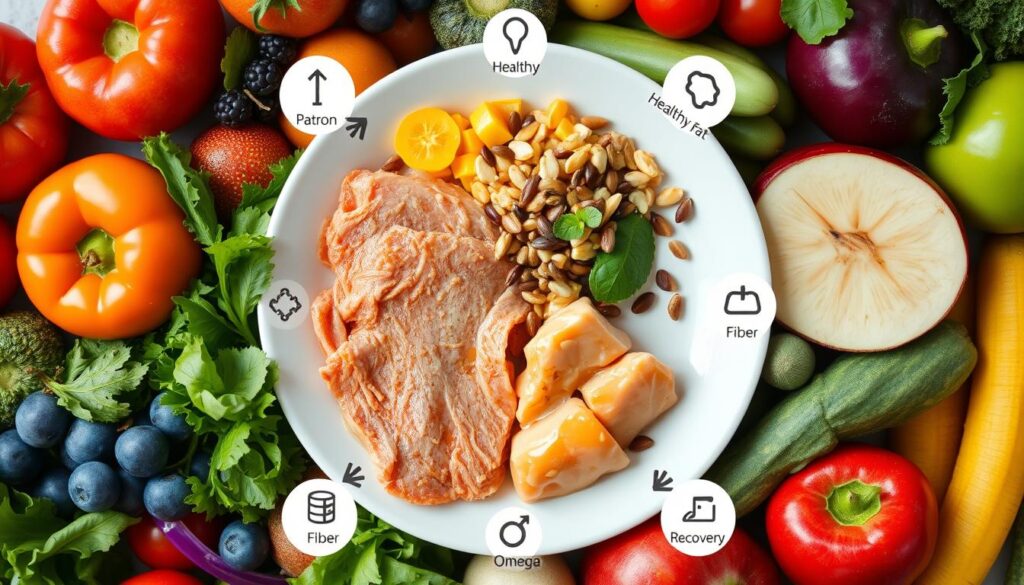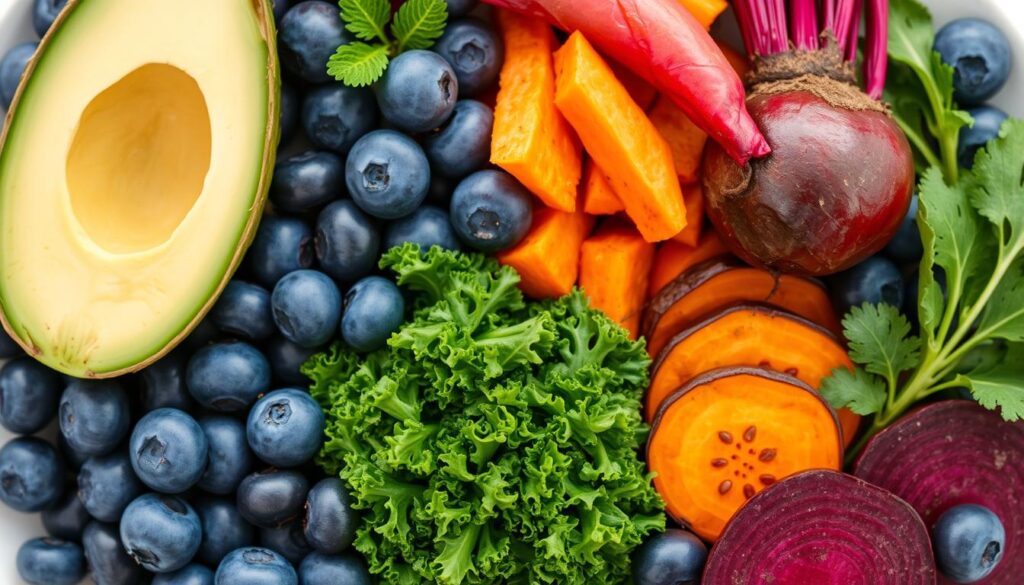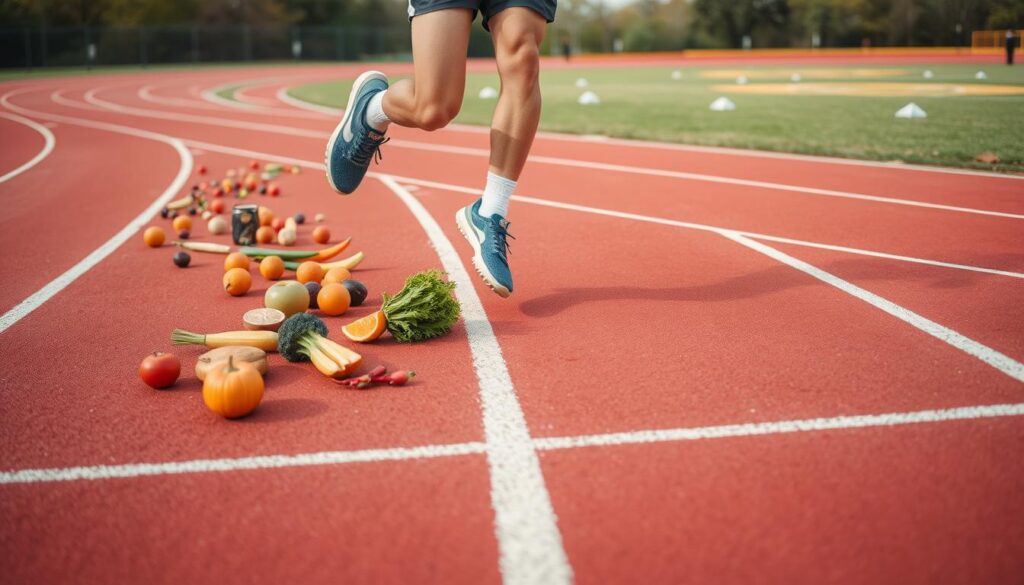Did you know the dietary supplement industry is worth $37 billion a year? Yet, experts say the best way to get needed nutrients is through food. What you eat greatly affects how fast and well your body heals after an injury or hard workout.
Proper nutrition is key for healing after exercise and recovery. Your body needs protein, carbs, healthy fats, vitamins, and minerals to fix and rebuild damaged tissues. Eating the right foods helps you recover faster and get back to your activities sooner.
A nutritious diet also helps with your mood, sleep, and energy during recovery. Being well-nourished helps you tackle recovery challenges and stay positive throughout.
Key Takeaways
- A balanced diet is the best way to get the nutrients your body needs for recovery.
- Proper nutrition can speed up healing time after an injury or intense workout.
- Nutrients like protein, carbs, healthy fats, vitamins, and minerals are essential for tissue repair.
- A nutritious diet can improve mood, sleep quality, and energy levels during recovery.
- Fueling your body with the right foods is crucial for a successful comeback.
Table of Contents
The Importance of Proper Nutrition in Recovery
Starting your recovery journey means understanding how key nutrition is. Eating right helps your body heal faster, boosts your health, and lowers the chance of relapsing. A balanced diet is a big part of taking care of yourself and can greatly improve your recovery.
How Nutrition Affects Recovery Time
What you eat affects how well your body heals and regenerates. Eating foods rich in carbs, lean proteins, and healthy fats boosts your energy and helps with recovery. Vitamins C, D, E, omega-3 fatty acids, and minerals like zinc and magnesium are key for less inflammation, strong immune function, and fixing tissues.
| Nutrient | Benefits in Recovery |
|---|---|
| Omega-3 Fatty Acids | Reduces inflammation, supports brain health |
| Vitamin C | Boosts immune system, promotes wound healing |
| Magnesium | Improves sleep quality, reduces stress levels |
| B Vitamins | Enhances mood, supports energy production |
The Role of Self-Care in Preventing Relapse
Self-care, including good nutrition, helps prevent relapse. Eating foods that are good for you supports your body, mind, and emotions. A balanced diet can make your mood more stable, lessen cravings, and help your brain learn healthy habits.
Recovery is a journey, and eating right is a key part of it. By choosing what you eat wisely and focusing on your nutritional needs, you’re looking after your long-term health. This increases your chances of a lasting recovery.
Your body has an incredible capacity to repair and regenerate when provided with the right fuel.
Understanding Macronutrients and Micronutrients
To get better at recovering, knowing about macronutrients and micronutrients is key. Macronutrients like carbs, proteins, and fats are big parts of your diet. They are measured in grams. Micronutrients, like vitamins and minerals, are smaller parts needed in tiny amounts.

Protein: Building Blocks for Tissue Repair
Protein is vital for fixing and building muscle tissue. It’s a main macronutrient for recovery. Made of 20 amino acids, proteins help muscles, tendons, and organs stay strong. Spread out your protein intake during the day to help muscles repair.
Carbohydrates: Fueling Your Body's Energy Needs
Carbs are the main energy source for your body and muscles. They help with nerve function, muscle work, and making proteins. Eating carbs and proteins in a 3:1 or 4:1 ratio within an hour after working out helps with recovery and fixing muscles.
Fats: Essential for Nutrient Absorption and Joint Health
Fats are important for energy, protecting organs, and making hormones. Healthy fats are better for you and don’t clog arteries like saturated fats do. Adding healthy fats to meals helps with blood sugar levels and absorbs vitamins and antioxidants.
Vitamins and Minerals: Key Players in Recovery
Vitamins and minerals are crucial for many body functions, metabolism, and health. They help with immunity, blood pressure, and bone strength. You can find them in seafood, dairy, legumes, nuts, seeds, fruits, and veggies.
| Macronutrients | Recommended Ratio |
|---|---|
| Carbohydrates | 40% |
| Proteins | 30% |
| Fats | 30% |
By eating the right mix of macronutrients and micronutrients, you give your body what it needs for recovery and good health.
Anti-Inflammatory Foods to Support Healing
Inflammation is a natural response to injury or surgery. But too much can slow down healing. Eating anti-inflammatory foods can help your body recover better. Foods rich in omega-3 fatty acids and vitamin C are great for this.

Omega-3 fatty acids help make new muscle proteins and reduce inflammation. You can find them in:
- Fatty fish (salmon, tuna, sardines)
- Walnuts
- Chia seeds
- Flaxseeds or flaxseed oil
- Fortified eggs
- Canola oil
Vitamin C is an antioxidant that fights inflammation and helps with healing. Add these foods to your diet for more vitamin C:
- Citrus fruits (oranges, grapefruits, lemons)
- Berries (strawberries, raspberries, blueberries)
- Leafy greens (spinach, kale, collard greens)
- Bell peppers
- Broccoli
- Brussels sprouts
- Kiwis
Just 3 ounces of wild-caught salmon delivers over 70% of daily needs for selenium, a mineral that supports immune function and wound healing.
Other foods that help with healing include:
| Food | Anti-Inflammatory Benefits |
|---|---|
| Berries | Contain antioxidants like anthocyanins that provide anti-inflammatory and immune-supporting effects |
| Nuts and Seeds | Good source of zinc, vitamin E, manganese, and magnesium, which are critical for immune health |
| Leafy Greens | High in vitamin C, manganese, magnesium, folate, and provitamin A, all essential for immune function and overall health |
| Ginger | Known for its anti-inflammatory properties that help in reducing swelling and pain post-surgery |
| Pineapple | Contains bromelain, which aids in reducing inflammation and swelling post-surgery, while also providing vitamin C to support healing |
Adding these anti-inflammatory foods to your diet after surgery helps your body heal better. It supports a smooth recovery.
Hydration: The Unsung Hero of Recovery
Starting your recovery journey means understanding how important hydration is. It’s key for your body to heal well. Our bodies are mostly water, showing how crucial it is to drink enough.
The Importance of Staying Hydrated
Being hydrated is crucial when you’re recovering. Not drinking enough water can make you tired, weaker, and less sharp mentally. Drinking enough water helps a lot, like:
- Boosting metabolism by up to 30% in healthy individuals (Journal of Clinical Endocrinology & Metabolism)
- Promoting weight loss by reducing calorie intake when drinking water before meals (Obesity)
- Improving diet quality, as increased water consumption is linked to better dietary choices (American Journal of Clinical Nutrition)
Make sure you’re drinking enough by checking your urine. If it’s pale yellow or clear, you’re good.
Creative Ways to Increase Fluid Intake
There are fun ways to drink more water and reach your goals. Here are some ideas:
| Strategy | Description |
|---|---|
| Infused Water | Add slices of fresh fruits like lemon, lime, or strawberries to your water for a refreshing and flavorful twist. |
| Herbal Teas | Explore a variety of caffeine-free herbal teas, such as chamomile, peppermint, or ginger, for a soothing and hydrating beverage. |
| Flavored Sparkling Water | Opt for naturally flavored sparkling water as a low-calorie alternative to sugary drinks. |
| Water-Rich Foods | Incorporate water-rich fruits and vegetables like melon, strawberries, lettuce, and celery into your diet for added hydration. |
“Water is the driving force of all nature.” – Leonardo da Vinci
While water is best, you can also get fluids from coffee, tea, and soups. By focusing on staying hydrated and finding fun ways to drink more, you help your body recover better.
Nutrition and Recovery: Tailoring Your Diet to Your Injury
Understanding your nutrition needs is key when you’re recovering from an injury. The type and severity of your injury can change what you need to eat. For example, if you got a concussion playing football or had major surgery, you’ll need more nutrients than someone with a minor injury like a twisted ankle. It’s smart to talk to a dietitian or healthcare provider for advice if your injury is serious.
A study in the National Center for Biotechnology Information (NCBI) shows how important good nutrition is for athletes. It helps them stay energetic and perform better. The study also points out that eating enough protein is key for fixing muscles and getting back to normal.
Good nutrition is also vital for preventing injuries and keeping bones strong. It helps with connective tissues and keeps the immune system healthy. Physical therapists like those at Motive Sports & Physical Therapy can give you a diet plan to help you heal faster. This plan can help you get stronger, move better, and feel less pain.
“Nutritional strategies play a crucial role in the rehabilitation of musculoskeletal injuries in athletes” (Giraldo-Vallejo JE et al., 2023).
Here are some tips for eating right after an injury:
- Try to eat 1.6-2.5g of protein per kilogram of your body weight every day, based on your injury stage.
- For carbs, aim for 3-5g per kilogram of body weight daily.
- Consider taking creatine monohydrate, 10 g a day for two weeks, then 5 g a day.
- For lean muscle support, take β-hydroxy-β-methylbutyrate (HMB), 3g a day.
- For inflammation and antioxidants, take fish oil supplements, 3-4g a day of DHA + EPA.
- For muscle recovery, take branched-chain amino acids (BCAAs), 3g every 3-4 hours.
- Before bed, have 20-25g of casein to help with muscle repair.
- Drink tart cherry juice, 12oz to 24oz a day, for its anti-inflammatory effects.
Eating foods high in zinc like beef, oysters, and whole grains can also help with healing. By eating right for your injury, you can help your body heal faster and recover quicker.
Meal Planning and Preparation for Optimal Recovery
Planning your meals is key to boosting your body’s recovery. By focusing on meal planning and preparation, you make sure your body gets the nutrients it needs to heal. Adding nutrient-dense foods to your diet helps you recover faster and supports your goals.
Balanced Meal Ideas to Support Healing
For the best recovery meals, mix protein, carbs, and healthy fats. The International Society of Sports Nutrition (ISSN) says eat 20 to 40 grams of protein every 3 to 4 hours. This helps with muscle recovery and exercise performance. They also recommend 3.6 to 5.5 g of carbs per pound of body weight daily for glycogen stores, especially for endurance athletes.
Here are some meal ideas for healing:
- Grilled chicken breast with quinoa and steamed vegetables
- Baked salmon with sweet potato and sautéed spinach
- Vegetarian chili with brown rice and a side salad
- Turkey and avocado wrap with whole-grain tortilla and sliced veggies
Healthy Snack Options for Recovery
Healthy snacks are also crucial for recovery. Choose snacks with protein and carbs to repair muscles and refill energy. Good snack options include protein-rich foods like cottage cheese, tofu, and Greek yogurt. Carbs can come from fruits, oatmeal, and quinoa.
| Snack Idea | Protein Content | Carbohydrate Content |
|---|---|---|
| Greek yogurt with berries and granola | 20-25g | 30-40g |
| Hummus with whole-grain pita and sliced veggies | 15-20g | 20-30g |
| Trail mix with nuts, seeds, and dried fruit | 15-20g | 20-30g |
| Cottage cheese with sliced tomatoes and whole-grain crackers | 20-25g | 15-25g |
Using these meal and snack ideas in your recovery plan helps your body heal faster. Tailor your nutrition to your training and goals for the best recovery results.
Conclusion
Nutrition is key to healing, whether you’re recovering from an injury, surgery, or overcoming substance abuse. It’s important to know about macronutrients like protein, carbs, and fats. Also, micronutrients such as vitamins and minerals are crucial.
Adding anti-inflammatory foods and drinking plenty of water are also vital. A diet tailored to your needs, whether you’re an athlete or dealing with sarcopenia, can greatly improve your recovery. Planning your meals and choosing healthy snacks helps keep your body well-fed for healing.
Your food choices are a big part of getting better. By picking the right foods and drinks, you can bounce back and set the stage for a healthier life. Use nutrition to help your recovery, and see your health and strength increase every day.
FAQ
How does nutrition affect recovery time?
Eating well is key to speeding up your recovery and helping you heal faster. A good diet helps fix and grow new tissue, reduces swelling, supports bone healing, and gives your body the energy it needs to heal.
What role does self-care play in preventing relapse?
Taking good care of yourself, including eating right, is a big help in your recovery. On the other hand, not taking care of yourself can lead to relapse. Adding nutrition tips to your recovery plan can greatly improve your healing.
What are macronutrients, and why are they important?
Macronutrients are protein, carbohydrates, and fats. Protein is key for breaking down food for energy and building muscles and other body structures. Carbs are the main energy source for the body. Healthy fats help absorb vitamins A, D, E, and K.
Which anti-inflammatory foods can support healing?
Foods high in omega-3 fatty acids like walnuts, tuna, salmon, chia seeds, and flaxseeds help reduce inflammation. Vitamin C in foods like broccoli, bell peppers, oranges, and strawberries also fights inflammation. It helps with healing, growing new tissue, and repairing.
How much water should I drink to stay properly hydrated during recovery?
It’s advised to drink six to eight 8-ounce glasses of fluids daily, mostly water. Staying hydrated is crucial for your health. It keeps tissues moist, controls body temperature, supports joints, aids nutrient processing, and removes waste.
Do different types of injuries require different nutrition needs?
Yes, the type of injury affects your nutrition needs. For example, after a concussion or major surgery, you’ll need more nutrients. Talk to a dietitian or your doctor about the best diet for your recovery.
What are some healthy snack options to support recovery between meals?
Snacks like Greek yogurt, nuts, seeds, and fruits are great for healing between meals. They give you protein, healthy fats, and carbs to help your body recover.
Source Links
- A Practical Handbook for Good Nutrition in Recovery | Silver Ridge Recovery
- 6 ways proper nutrition helps heal sports injuries
- Best Food and Drinks for Active Recovery
- 6 Benefits of Proper Nutrition and Diet in Addiction Recovery
- The Importance of Nutrition in Recovery: What the Research Shows – CASAT OnDemand
- Micronutrients vs. Macronutrients: Discover Balanced Diet
- Macros, Micros, and More: Understanding Nutrient Balance for Energy and Recovery – Eastside Ideal Health
- A Complete Guide to Macronutrients for Fitness Beginners
- Healing Foods: 10 Foods That Help Your Body Recover
- 10 Nutrient-Packed Foods to Aid Recovery After Plastic Surgery — Adam Levy, MD
- Hydration: The Unsung Hero of Fitness
- The Unsung Hero of Fitness & Weight Loss – Pittsburgh North Fitness
- Nutrition Needs During Recovery Following Athletic Injury
- Accelerating Sports Injury Recovery with Proper Nutrition
- Post-Workout Nutrition
- How to enhance recovery through nutrition – Performance Optimal Health
- Rehabilitation Nutrition for Injury Recovery of Athletes: The Role of Macronutrient Intake
- What role does nutrition play in the physical and mental recovery process?

Hey, I am Dr. Jenna Calloway. What you put into your body is what, intrinsically, makes the difference between success and burnout. Healthy food is fuel, and after years of working with high-performing professionals, I’ve put together nutrition strategies that are not only healthy but delicious and realistically easy to fit into your busy life. Whether you’re powering through a hectic day or looking to elevate your workouts, let me guide you on the path toward feeling your absolute best!

